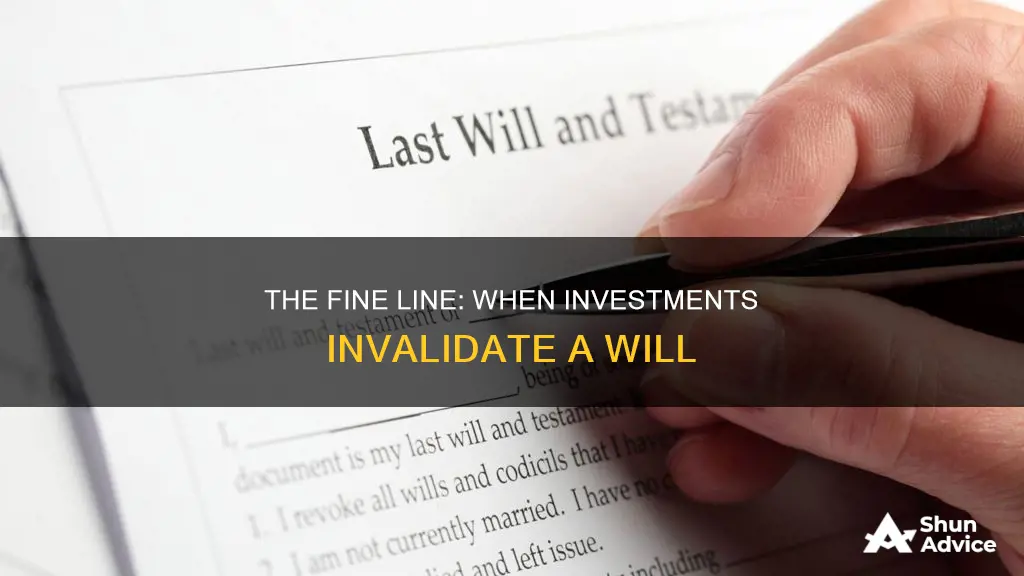
There are several reasons why a will may be invalidated. These include insufficient testamentary capacity, undue influence, fraud, and not following state guidelines. For example, if a will is deemed to have been created under pressure or coercion, it may be invalidated. Similarly, if the testator, or person making the will, is found to lack mental capacity, the will may be deemed invalid. In addition, wills that are not properly witnessed or signed, or do not follow state-specific requirements, may also be invalidated.
| Characteristics | Values |
|---|---|
| Holographic will | A handwritten will without any witnesses. Some states consider this to be invalid, while others do not. |
| Proper witnesses | Most states require 2-3 witnesses over the age of 18 who are not beneficiaries or the executor of the will. |
| Previous wills | All previous wills must be destroyed. |
| Testamentary capacity | The testator must meet a basic competency test to create a valid will. |
| State provisions | Each state has its own requirements and preferred language that should be used in a will. |
| Undue influence | A will may be invalidated if it is proven that the testator was under pressure or coercion. |
| Fraud | A will may be invalidated if it is proven that the testator was tricked into signing the will. |
| Multiple wills | Multiple wills may cause confusion, and only the most recent one may be considered valid. |
What You'll Learn

Holographic wills
A holographic will is a handwritten and testator-signed document that does not require witnesses or notarization. It is an alternative to a will produced by a lawyer. Holographic wills are accepted to varying degrees in the following states:
- Alaska
- Arizona
- Arkansas
- California
- Colorado
- Hawaii
- Idaho
- Kentucky
- Louisiana
- Maine
- Michigan
- Mississippi
- Montana
- Nebraska
- Nevada
- New Jersey
- North Carolina
- North Dakota
- Oklahoma
- Pennsylvania
- South Dakota
- Tennessee
- Texas
- Utah
- Virginia
- West Virginia
- Wyoming
Some states that do not typically recognize holographic wills will accept those made in jurisdictions where they are recognized. These states include:
- Alabama
- Connecticut
- Indiana
- Iowa
- Kansas
- Massachusetts
- Minnesota
- Missouri
- New Hampshire
- New Mexico
- Oregon
- Rhode Island
- South Carolina
- Vermont
- Washington
- Wisconsin
In New York and Maryland, holographic wills are only recognized if they are made by a member of the Armed Forces. In Maryland, these wills are valid for one year after the testator leaves the Armed Forces unless they are no longer of sound mind. In New York, such a will is valid for one year after the testator is discharged from the Armed Forces or for one year after they regain a testamentary capacity, whichever is later.
To be considered valid, holographic wills must meet specific requirements. The minimal requirements for most states are proof that the testator wrote the will and evidence that the testator had the mental capacity to write the will. As with any will, the testator must be explicit about named beneficiaries and the receipt of property or assets. Some lawyers recommend that explaining why specific assets are left to certain beneficiaries can indicate that the testator was of sound mind.
Paying Off Debt vs. Investing: Which Should You Prioritize?
You may want to see also

Lack of witnesses
A will must be properly witnessed to be considered valid. In most states, two or three witnesses over the age of 18 must be present when the will is signed. These witnesses must also be "disinterested", meaning they do not stand to inherit anything from the will. While notarization is not required, it can be beneficial to have a "self-proving affidavit" notarized and attached to the will.
The witnesses' role is to confirm that the will-maker is of sound mind and not under any undue influence. They must also be aware that the document being signed is indeed the person's will. In most cases, the witnesses will be required to sign a statement to this effect, and they may also be required to initial each page of the will.
The absence of witnesses or the inability to locate them does not automatically render the will void. However, it can complicate the probate process, especially in states that require witness signatures. If the witnesses to a will cannot be found, it is advisable to consult a lawyer to determine the best course of action.
It is important to note that some states accept "holographic wills," which are handwritten and do not require witnesses. However, even in these states, there may be specific requirements that need to be met for the will to be considered valid. Therefore, it is generally recommended to have a will properly witnessed, regardless of the state you live in.
Weighing the Benefits: Navigating the World of Investments
You may want to see also

Previous wills not destroyed
When it comes to creating a will, there are several nuances to be aware of to ensure that the document is valid. One of the most important things to do is to destroy all previous wills and drafts. This is because if the current will cannot be found, an old will might be used instead.
If you have multiple versions of your will, it is crucial that you destroy any previous versions and drafts when you create a new one. This ensures that your most up-to-date wishes are carried out and avoids any confusion or complications that could arise from having multiple versions in existence.
It is also important to note that simply writing a new will does not automatically revoke previous versions. To revoke a will, you must either destroy it or include language in the new will that expressly revokes all prior wills. For example, you could state, "I hereby revoke any and all old wills that I have previously made."
There are many ways to destroy a will, such as tearing it up, burning it, shredding it, or writing "I revoke this will" on each page and signing it. The key is to perform some "physical act" that indicates your intention to revoke the previous will.
By destroying your old wills, you can prevent potential conflicts, misunderstandings, and costly litigation that could arise from having multiple versions of your will in circulation.
Mineral Rights: A Guide to Investing
You may want to see also

Testamentary incapacity
Testamentary capacity is a legal term that refers to a person's mental ability to write a will. In other words, it is the ability to make a valid will. To have testamentary capacity, a person must have the mental capacity to understand the basic mechanics of how a will works, including what property they own and who their beneficiaries are.
Most states have both an age requirement (usually 18 years old) and a mental capacity requirement. To meet the mental capacity requirement, the testator (the person making the will) must be able to demonstrate:
- Knowledge of the nature and extent of their property
- Knowledge of the natural objects of their property (i.e. their relatives)
- Understanding of the disposition that their will is making
- The ability to connect all of these elements together to form a coherent plan
People with dementia or other mental impairments can still create a valid will if they make it during a lucid interval, when they are not suffering from an insane delusion or other cognitive impairment. If you are worried about your mental capacity, it is recommended that you work with an attorney to provide proper documentation, which might include a physician's report or even a video of yourself.
If you are left out of a will and believe that you have grounds to contest it, you must prove coercion, diminished mental capacity, or outright fraud. This can be a difficult and costly process, so it is important to consider the financial and emotional implications before proceeding.
Maximizing Your Inheritance: Smart Investment Strategies to Minimize Tax Burdens
You may want to see also

Undue influence
To prove undue influence in court, the person contesting the will must usually demonstrate the following:
- The will left property in a way that was unexpected or inequitable, such as close family members being left out or disinherited.
- There was a "confidential relationship" or a relationship of trust between the testator and the person exerting influence, such as a lawyer, caretaker, or family member relationship.
- The testator was susceptible to undue influence due to illness, frailty, or a weakened mental state.
- The influencer took advantage of the testator and benefited from the will through improper means, substituting their wishes for that of the testator.
It is important to note that simply persuading a testator to write or revise their will in a certain manner does not constitute undue influence. The court will look for evidence that the influencer exerted coercion, control, or manipulation over the testator's decisions.
Proving undue influence can be challenging, as it often occurs behind closed doors. Contestants may rely on circumstantial evidence, such as the testator's vulnerability and the influencer's power or authority over them. Evidence may include testimony from family members, friends, healthcare providers, lawyers, and other individuals with knowledge of the relationship between the testator and the alleged influencer.
Federal Retirement Thrift Investment Savings Plan: Maximizing Your Retirement Benefits
You may want to see also
Frequently asked questions
For a will to be legally valid and enforceable, it must comply with the requirements set out in section 9 of the Wills Act 1937. In England and Wales, a will must be in writing and signed by the testator with the intention of creating a valid will. The testator's signature must be made in the presence of two independent adult witnesses who are not beneficiaries of the will, and both witnesses must also sign the will.
If a will is found to be invalid, this could cost the beneficiaries thousands of pounds and delay the distribution of the deceased's assets. The appointed executor of the estate will be unable to obtain the grant of probate, and without this grant, the deceased's assets cannot be accessed or distributed to any of the beneficiaries. If the circumstances cannot be resolved, or a previously valid will presented, the testator will be deemed to have died intestate, meaning that the rules of intestacy will determine how the estate will be distributed.
A will may be considered invalid if it was forged, if the testator lacked the mental capacity to understand their actions, if the testator was manipulated, pressured, or coerced into signing the will, if the will was not properly signed or witnessed, or if the testator did not know or approve the contents of the will.
Undue influence occurs when a person coerces the testator into creating and signing a will against their wishes, usually with the influencer benefiting from the will. If undue influence is proven in court, a will can be ruled invalid.







